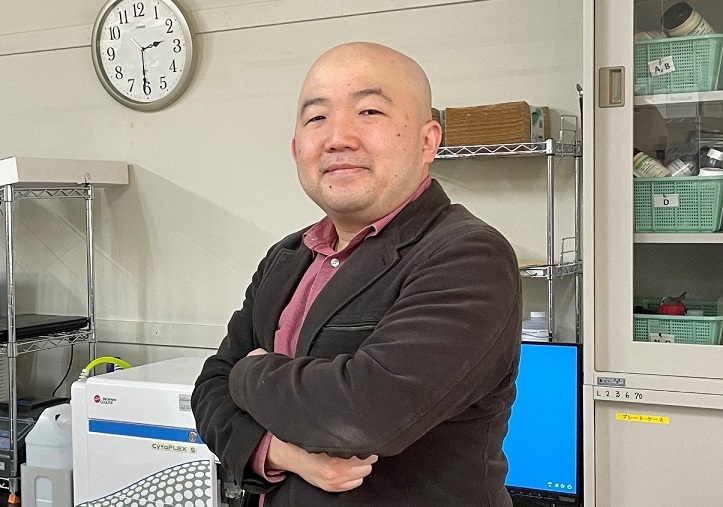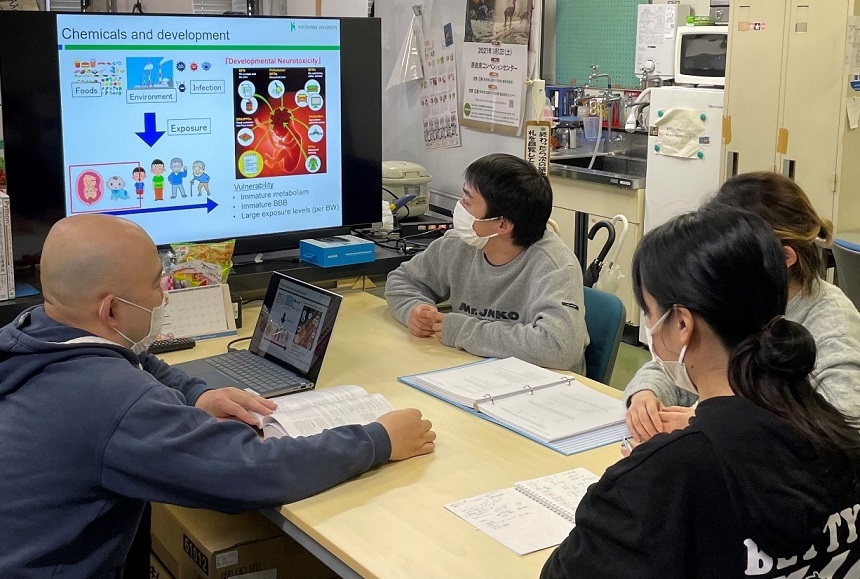On February 1, 2013, Hiroshima University established two new programs: the “Distinguished Professors” (DP) program and the “Distinguished Researchers” (DR) program. Individuals who are part of these programs are recognized as senior and junior faculty members respectively, who are engaged in extraordinarily distinguished research activities.
A Conversation with Distinguished Researcher Yasuhiro Ishihara

Could you please introduce yourself and your research field?
I am an Associate Professor at the Graduate School of Integrated Sciences for Life at Hiroshima University. Broadly, my research fields include environmental science, pharmacology, toxicology, and agricultural sciences. Specifically, I am interested in understanding how the exposure to certain commonly used drugs and chemicals affect human health.
How did you get interested in this field, especially given that your major in high school was in history? Please take us through your journey so far in terms of education and research.
It is quite an interesting story, as like you said, I majored in history during high school! However, I got interested in the field of chemistry while attending University for my undergraduate education. I remember that one of my professors sparked my interest in electron mobility and flow by explaining how electron flow within human cells results in the formation of ATP (adenosine triphosphate), which is essential for generating energy, that we need for sustenance. I found this synergy between biology and chemistry within human cells highly intriguing, which led me to the field of biological chemistry. Eventually, I completed my PhD in the field of life sciences and biomedical sciences. Currently, I am highly interested in pharmacology and toxicology, to understand the effect of environmental chemicals and drugs on the human body.

Dr. Ishihara's current research focuses on the effects of chemicals on the developing brain (Image courtesy Yasuhiro Ishihara)
Tell us about your research field. What have you found particularly interesting or rewarding?
My latest research topic focuses on the effect of chemicals on the developing brain. In the developmental stage, the blood brain barrier and the metabolic systems surrounding it are immature, which make the brain vulnerable to exposure by certain chemicals. Currently, I am trying to understand the effect of valproic acid – an antiepileptic drug, on the developing brain.
It has been observed that if pregnant women are exposed to valproic acid, the neurological development of the growing fetus may be poorly impacted, leading to learning disabilities later in life. Since the mechanisms behind the effect of valproic acid on the brain are unclear, my research team and I are aiming to elucidate the mechanisms through which valproic acid affects the immune system within the brain. We have conducted experiments on mice and observed signs of autism and memory loss among them, upon treatment with valproic acid. One of our interesting findings was that microglial cells, which are important immune cells within the brain, get over-activated under chemical exposure and injure the neural circuit, which could potentially cause learning and behavioral disorders.
What are some of the major projects that you are working on right now?
One of the key projects my team and I are working on, is to understand how PM2.5 – a type of fine particle suspended in the air, affects brain development and diseases. There is evidence suggesting that people who live in polluted areas are prone to more serious neurodegenerative disorders. We hypothesize that upon inhalation, the pollutant PM2.5 might get transferred from the nasal track to the brain via connecting neurons, and negatively affects the nervous system. We want to elucidate the true nature of the weakening of the nervous system and its immune system, via exposure to such fine atmospheric air pollutants. However, we are yet to observe any concrete results, and hope to achieve that soon.
What are some of the key practical applications of your research? What will be the impact of your research on the society?
My research can be very beneficial for the development of therapeutic and preventive measures for autism and related neurological disorders caused by chemical exposure. Our observations can also be used as a recommendation for relevant policy makers and organizations for strict regulation of the levels of PM2.5 and other air pollutants, to limit their exposure in the environment.
What are some of the challenges in the field of environmental toxicology?
One of the challenges I face during my experiments is the detection of chemicals within the human body as compared to proteins. This is because chemicals diffuse into surrounding substances or tissues very easily, and their detection requires a lot of experimentation. Another challenge I routinely face is balancing my time to independently conduct experiments, while also managing the experiments of my students.
What new research theme are you interested in exploring in the future?
In the future, I would like to collaborate with cosmetic companies in Japan that create skin-care products. These products might contain pollutants such as PM2.5, which are also harmful to the skin. Through such collaborations, I would like to contribute to the development of safer cosmetics, i.e., "anti-pollution" cosmetics.

Dr. Ishihara believes in encouraging students to collaborate with their peers and practice their presentation skills (Image courtesy Yasuhiro Ishihara)
Do you have any advice for your students and young researchers?
My advice for young researchers is to be consistent with their experiments and to get involved in scientific discussions and collaborations with their peers. I also recommend practicing presentation skills to communicate important research information with utmost clarity. I believe that consistency with experimentation is key to successful research. More importantly, maintaining a practical attitude, and choosing to solve realistic research problems is far better than developing grand hypotheses which are not feasible to work on.
Finally, what do you do in your free time?
I like to play with my children in my free time. I am also very interested in creating desktop music (DTM) on my computer while my wife plays the mandolin and piano. We make music together, and I really love it!

 Home
Home